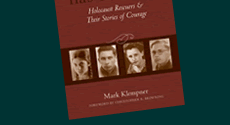Light in Darkness
This article, written by Arthur Paul Boers, was orginally published in the Catholic New Times on 26 November 2006.
My mother, a young girl during the Nazi occupation of the Netherlands, tells fascinating accounts of that time. Unfamiliar children regularly appeared in her school during those years, “adopted” by Frisian farmers. The new students were described as nephews and nieces from elsewhere, but it was common knowledge that they were actually Jewish children. Thus they were protected from abduction by the Nazis, deportation to concentration camps, and subsequent slavery, torture, and death. Mark Klempner, an oral historian, is fascinated by such rescues. He is the child of Polish Jews who narrowly averted the Holocaust. Many of his relatives were not so fortunate. While he felt a need to learn more about World War II, he was reluctant to do so in Poland, where family memories were too raw. Thus he chose instead to get to know a number of Dutch people who were involved in the risky work of protecting and hiding Jews. The Dutch saw policies towards Jews move from denigration to isolation, then to deportation and finally killing. Some rescuers resisted Nazis from the beginning of the occupation. Others drew the line once incremental changes went too far. In the face of the incomprehensibly evil Holocaust, we are also confronted with the almost inexplicable goodness of rescuers. The creativity and imagination with which they engaged their circumstances is astonishing. These stories of resilience and courage are recounted with humour, humanity and humility. Here Klempner collects and reflects on long intense conversations with 10 such remarkably diverse people: men and women, Calvinists and Catholics, atheists and socialists. These people had no common ideology, but all lived out of deep wells of empathy. They each prove to be independent thinkers, able to discern when they needed to take risky steps of resistance on their own without official or ecclesial sanction. Not surprisingly, decades later, the rescuers still continue to be involved in volunteering and working for peace and justice. Most of Klempner’s subjects are matter- of-fact about their actions. It was the obvious, common sense thing to do, they say. No big deal. Their empathy was so deep-seated that they could imagine no other choice. The portraits in the book are honest and complex. Some rescuers still harbour deep anger and rage. Others have been able to offer forgiveness. Many think they could have done more. In several cases, the traumas of the war and the toll of resistance continued to adversely affect personal wellbeing and relationships for many years. A few miss the moral clarity and excitement of life during those times. Klempner’s relationship with the rescuers worked at many deep levels. After years as a professional musician, he found himself deeply depressed and facing a crisis of purpose. His new work as an oral historian was already a move toward a deeper and more meaningful lifestyle. This project helped him deal with his family’s aversion to dealing with the Holocaust. This experience also helped him to reclaim Judaism. Intriguingly, he stays in close contact with people he interviewed, even 10 to 15 years later. By now, half of the people Klempner featured in this book have died. The rest are aging. None are famous. Yet, their stories are invaluable. It is a common assertion in our culture that World War II is an era from which we need to learn. Unfortunately, the lessons derived are not always useful or ethical, let alone particularly Christian. One thinks, for example, of how cynically the current U.S. administration uses World War II rhetoric and supposed parallels to justify its aggressive folly in Iraq and elsewhere. Thus George W. Bush and company exonerate hateful actions which cost the lives of tens — if not hundreds — of thousands. In the final analysis, however, the Second World War ought to be a judgment on us all. The rescuers, by their brave and exceptional examples, continue to challenge us with what we must all hear and learn. They remind us that governments are not always trustworthy and should not always be obeyed. They caution us against being taken in by the big lies of those in power. They call us to compassion and empathy, especially for those who are vulnerable before state policies. They challenge us to live by faith and conscience. Most of all they demonstrate that even in the face of overwhelming horrors, one can resist evil without becoming evil. These are the true lessons of the Second World War. As Klempner notes by quoting Richard Bach, “We need to know people who have made choices that we can make too, to turn us into human beings.” Arthur Paul Boers teaches pastoral theology at Associated Mennonite Biblical Seminary in Elkhart, Indiana and is the author of the forthcoming The Way is Made by Walking: A Pilgrimage Along the Camino de Santiago (InverVarsity Press).©2006 The Catholic New Times

